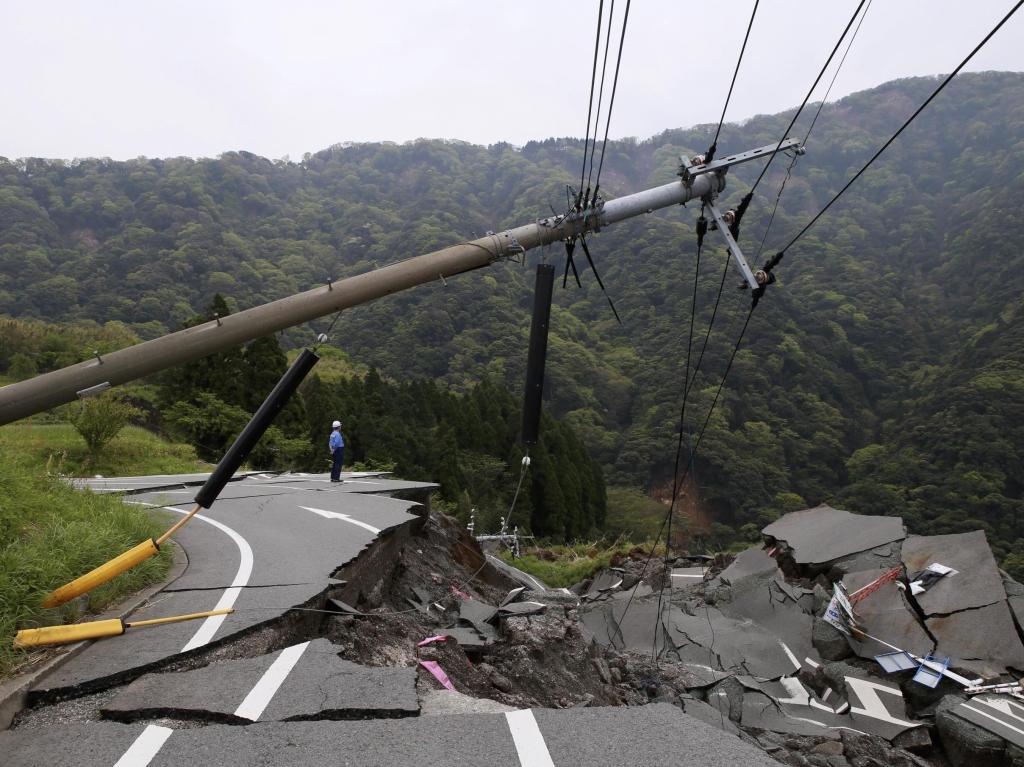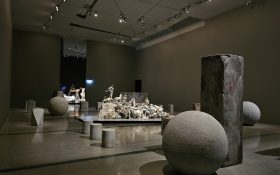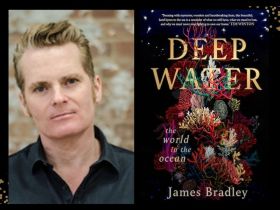Image via Shutterstock
Working in the arts industry can be something of a lottery, with a range of potentially disastrous risk factors lurking in the wings that require skilled management to avoid.
Some sectors are more risk-prone than others. The very nature of the independent theatre sector, for instance, means that understudies are rarely on hand to step into a leading role, which can sometimes result in productions closing at the last minute when key personnel are called away.
Nor are larger organisations immune to the vagaries of fate. From natural disasters to unexpected venue closures, no organisation is fully adversity-proof.
Thanks to the skills, ingenuity and dedication of our colleagues, such catastrophes rarely manifest – but when they do, it’s best to be prepared.
Natural disaster
The recent floods caused by Cyclone Debbie have caused widespread damage to artists and arts organisations in Northern NSW. As detailed by ArtsHub, the destruction was widespread, in part because the floodwaters rose so quickly.
Read: Floods devastate Northern Rivers arts community
One month on, as the community rebuilds, what has the Northern Rivers arts community learned from the disaster?
The damage inflicted was severe, said Patrick Healey, General Manager, Northern Rivers Performing Arts (NORPA).
‘We lost the entire ground floor which encompasses our rehearsal and venue hire spaces, commercial kitchen, and the box office and administration office. The flood and evacuation orders happened very quickly and with only a few of us in the office that night, we only managed to save about half the computers, the photocopier, some archiving materials and some basic furniture.’
Healey said there have been big challenges to work through as a result of the flood: the initial clean-up and then in the aftermath, the question of how to rebuild.
‘On day one it was [about] how to make the building safe for volunteers and staff to re-enter. Health was my first concern given the contaminants in the water and the possibility of electrical faults, etc. The hazmat team were wonderful! I can’t say enough about the emergency service workers and how much I relied on their knowledge and help,’ he said.
‘Oddly, that first week was very focused and we all just got in and physically worked for six days straight moving, hosing, cleaning and scrubbing. We were all very tired, but at the end of each day we could see we had made a difference. We didn’t feel helpless.’
Restoring a semblance of order was also part of the recovery process. ‘Two days after the flood had gone down, we managed to set up a makeshift one person office and process payroll. Protecting the staff and making sure they were all OK was a big concern,’ Healey explained.
‘A natural disaster is inherently chaotic and everything becomes uncertain. Early on, I made the decision not to lay staff off – some might see that as a risky decision – but I think the prospect of losing such an amazing team of artists, creatives and employees is a much bigger long-term risk to rebuilding our theatre company.’
As Healey and his team continue to rebuild, NORPA faces a range of additional challenges, such as the total lack of certainty about emergency funding. He has had to consider ‘cancelling shows and venue hires and for how far into the future? Or, to spend grant money earmarked for particular projects in the hope I can recover it with fundraising?
‘Losing income while we have a huge need to replace assets is the most serious challenge. It was just after the massive clean-up work, as I contemplated all of that, that there were times I felt hopeless and inadequate to the task,’ he said.
One take-home lesson from NORPA’s disaster recovery is the importance of creating order in the midst of chaos.
‘I took to making up lists of everything we lost. Then prioritising what should be done first to get the next show up in the theatre, finding a telephone and setting up a makeshift box-office, getting an internet connection, communicating with our local and national community and funding bodies,’ he explained.
‘Order is emerging, we can see what we need to do; we now need to find the means to do it. For that reason, I am incredibly grateful to AMPAG, APACA and Regional Arts Australia and the many people in the arts sector that are so generously helping us.’
A crowd-funding campaign to support NORPA has been established through the Australian Cultural Fund; click here for details.
Resurrecting NORPA has a broader effect that supporting just one regional arts organisation and its attendant staff and artists. As Healey explains, there are also flow-on effects for the broader Northern Rivers community.
‘Getting the creative sector – like NORPA – back up and running invigorates the town. It provides respite and community cohesion as we gather and celebrate the performing arts. Economically, it is vital. Of the 22,000 tickets NORPA sold in 2016, 45% of our audience came from outside of the Lismore Local Government area. Those visitors dine out in Lismore, go to other arts events, and contribute significantly to our economic wellbeing. The creative sector is a critical to the economic life of the region,’ he said.
Loss of venue
Disaster of another kind struck the State Opera of South Australia (SOSA) last year, when the company discovered its main venue – the Festival Theatre – would be unavailable for the bulk of the 2017 season. With just six months’ notice, and the bulk of the year’s program set in stone, Artistic Director and CEO Timothy Sexton was forced to find a creative solution to the crisis.
‘We lost two mainstage operas in the Festival Theatre at very short notice – and to be fair the Festival Theatre did its very best to try and keep the theatre open during that period; it was external voices that said “no actually you can’t do that, you’re going to have to close because all this stuff is happening.” … So presented with that we said okay, what do we do? Do we pause and do very little in that period and just try to quietly go down to a low hum and then pop out the other side? Or do we come out fighting and find different ways to engage; different ways to keep the company name out there?’
Read: The UNESCO City of Music without a concert hall
Instead of cancelling works and having a quiet year, Sexton and the SOSA team made the decision to actually increase their programming for 2017, presenting a wide range of smaller productions to replace the two cancelled mainstage productions.
‘What we’ve ended up doing is creating more products than we normally have in a year, more or less, and leveraging a number of different other venues but in particular our own, the Opera Studio … which is normally where we rehearse,’ he said.
‘So for two months of the year, June and July this year, we’re recreating it as an actual venue space called the Madrigal Room and we have three productions in there – and we have three other productions outside of that in the Studio as well: a developmental work; a collaboration with the Elder Conservatorium on Don Pasquale, and our young artist program as well … To essentially have something happen every two or three weeks for a period of about eight months, which for a small company like us is pretty demanding but it’s piqued people’s interest.
‘They’ve gone, “okay we understand we can’t get into the theatre but actually that’s a really creative solution.” And I think it’s because we as a small company are able to jump quickly and take everyone with us; I think with a larger company those wheels move a little bit slower,’ Sexton said.
As with NORPA’s decision not to lay off staff, SOSA has approached its crisis management plan with the wellbeing of its staff and artists at the forefront.
‘The important thing is to keep our people employed. It’s about a skill base. What the closure presented us with was the opportunity to increase our diversity, in what we were delivering. Which is not only interesting for the audience, it’s actually really good for the performers.,’ Sexton explained.
‘We’ve been working for a number of years now to developing an ensemble-style company, so we’re investing a lot in our South Australian performers … We’re developing up a resource here for which it is really important that we provide work. And okay it may not be a big, well-paid mainstage work that we give them but employment’s employment. And instead of doing one big show you’re doing four little ones across a really wide spectrum of activity. So it actually increases their skill base and it also gives our audience a greater choice.
‘It’s not a fabulous solution revenue-wise, though revenue is important, because the productions we’re doing are just not comparable to a Festival Theatre production – the economy of scale is completely different. And it still costs you money to put them on – it’s no less money to put them on necessarily but you just don’t get as much money back it. However in terms of insuring that the company has a profile and ensuring that we keep our people off the streets, engaged and busy is really, really important,’ he said.
‘I guess it’s a kink in the road for us – definitely a kink in the road, but one that takes us down a little side path that allows us to explore a whole lot of territory we wouldn’t have the finance normally to do if we were doing lots of big shows.’
The resilience of artists
Heidi Manché is the Director of Room to Play, an independent theatre company based in Brisbane. Recently, Room to Play staged a production of Tom Holloway’s Red Sky Morning, after a previous production of the play was cancelled on opening night in 2016. The new season was also troubled, with Cyclone Debbie forcing the cancellation of its 2017 opening night.
‘Last year the production shut on opening night due to unforeseen circumstances, and that was a huge shock to all of us … and then our second opening night [this year] the cyclone hit. So we had both our opening nights shut down. The curse of Red Sky Morning!’ Manché laughed.
While the independent theatre sector is inherently risky, Manché believes it’s also exceptionally resilient.
‘In theatre, independent theatre in particular, it’s a very collaborative, generous world at its best, and there is incredible resourcefulness and creativity and you have to have that to be sustainable,’ said Manché.
‘I guess when you put so much effort into something, the results can become quite extraordinary I think, because the cast and crew go “we’re committed to this.” It became less about us and more about the story and the audience and the play. I think that helped us because it was less about “poor me, look what’s happened, we’ve lost another show” and more about “we are determined as a group to make this happen because we really believe in this story and we really are passionate about putting this on.”
‘The bigger picture, believing in the integrity of the play and wanting to give a story to the audience – putting that before what happened in the moment, whether it’s a cyclone or a sudden change in cast – these are things that we learn from,’ she said.
Read: How art helps us cope with calamity
Manché stressed the importance of creating a culture of care when working independently, especially when disaster loomed.
‘Just check in where everyone’s at, all the time, and making sure – especially as independents where we’re running on a shoestring – that everyone’s okay at all times,’ she explained.
‘You’ve got this balance between wanting to do something extraordinary but not having the funds and so the time and resources to do so. So what that means is resourcefulness becomes so important – you get creative.
‘And nimbleness – you need to be able to work really quickly. For example, if you’re running an indie production and one of the actors has to step out for a film gig for two days, you’ve got to work with that – that’s the sort of flexibility and agility you have to have. You have to keep that responsibility and care in a process that can be fraught with problems, whether it’s a cyclone or an ensemble leak, which happens, or the needs of artists to work elsewhere suddenly just for their own sustainability.
‘The fact that it went down last time fueled my determination that it wouldn’t happen again – you can learn from that and I was really determined to make it happen. I really believe in the people that worked on this production … and everyone was keen to keep it going, so we got it up again – and then the cyclone hit!’
Creatives respond smarter
By their very nature, artists may be better suited to deal with crisis than workers in other sectors, said Peter Wood, Executive Director, Arts Northern Rivers.
‘It’s a community that has survived on the whiff of an oily rag so they know how to make do, they know how to get by, and they do that in creative ways every day in their creative lives – so once a natural disaster like [the floods] has hit I think they apply that same creative thinking and that same creative strategising to how they maintain their creative practice and maintain their work and how they survive as artists,’ he said.
Arts Northern Rivers, in conjunction with Common Ground Byron Bay, has established a crowdfunding campaign to assist the region’s creative community with flood recovery efforts. Visit www.gofundme.com for details.
Healey agreed that artists are by their very nature well suited to adapting to crisis.
‘It is the ability to imagine what can be that will define how we rebuild our town. Imagining it bigger and better and not giving in to the overwhelming sense of loss, or recoiling at the sight of piles of debris lining the streets and not being able to imagine them filled with people again. Being able to see past the destruction and what is possible is a vital ingredient to our recovery,’ he said.
‘I also think artists and creatives know how to put things together and are incredibly resourceful – paint becomes a mural; fabric, wood or steel can be turned into shopfront display. Those skills will be critical in a city with limited resources but where our creative capacity can be unlimited and help make the city liveable and alive again.
‘Already, through collaboration between Creative Lismore and the Lismore Chamber of Commerce and Industry, we have created a program to help inspire the town’s recovery called “The Art of Doing Business”. We will be putting an artist – probably one that lost their studio space – in an empty shop in the CBD. It is our hope that the work created by the artist will inspire people – give them the chance to see the creative process in action and the watch the act of making emerge before them.’
artsnorthernrivers.com.au
norpa.org.au
www.roomtoplay.com.au
saopera.sa.gov.au





